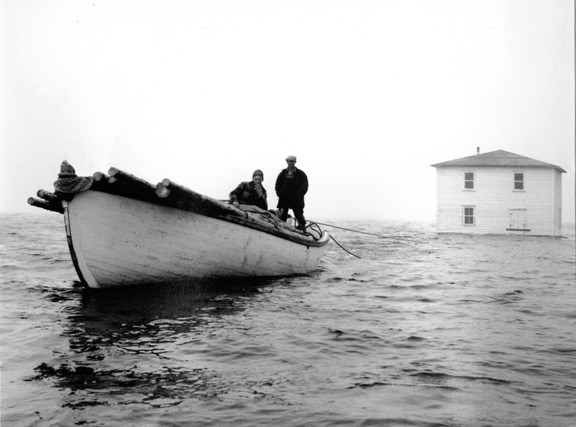"We must develop or perish," said Premier Joseph R Smallwood in July, 1949.
A very significant part of Newfoundland history is the Smallwood years from 1949-1972. During that time, Newfoundland joined confederation (1949) and the government sponsored resettlement with 110 communities being abandoned between 1954 and 1965, with a population of about 7,500. The main objective was to move people from small, isolated settlements to larger, more populated communities so that provisions such as health care facilities, schools, roads, and other services could be achieved more cheaply. The destinations of resettlers were chosen by government as growth centres. These places usually had fish plants and were heavily invested in by both levels of government. Financial assistance was offered to families starting at $150 per family and eventually increased to $600 per family. However, every household in a community had to agree to relocate before the money was paid. In all, 148 more communities were abandoned between 1965 and 1975, involving the relocation of an additional 20,000 people.
Of course, many Newfoundlanders and Labradorians refused to abandon or rebuild their homes. Alternatively, by barge, boat, blood and sweat, they moved. Across bays and around capes, family homes were floated to their new foundations and new beginnings.
Although resettlement was beneficial for both government and families, it also produced a great deal of stress and strain and caused community and family divides. The word resettlement continues to evoke strong emotion and its effect on living memory has been great. It is difficult to weigh out the benefits versus the trauma associated with such an uprooting of people. Resettlement has made its way into Newfoundland and Labrador's visual and performing arts, literature, and music.
The courage and strength of our ancestors goes beyond. Struggling through hardships and overcoming desperate situations has made our Newfoundland and Labrador legacy one that we all can be proud of.
I know what it's like to leave home, say goodbye to family and friends you've known all your life and not know when you'll be back again. To a point, I can relate to the personal struggles faced by many families all those years ago. In my case, I made the decision. Back then some families were forced to go, which made resettlement that much harder and put a great deal of strain on many relationships. Probably one of the hardest struggles is taking the children from the only life they've ever known, away from grandparents, aunts and uncles, friends and their loving environment. With that said, I know I've brought them to a place with greater opportunity, and they're still surrounded by a loving extended family, caring friends, warm neighbours and their school is safe and concerned about their education and welfare. They will always be reminded of where they came from and know about our heritage and culture.
Send me your thoughts on resettlement at [email protected]. Right On.



